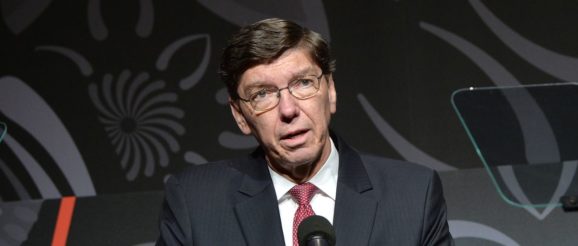Clayton Christensen, who coined the term ‘disruptive innovation,’ dies at 67


Photo by Slaven Vlasic/Getty Images for Tribeca Film Festival
Clayton Christensen, the business scholar who coined the term “disruptive innovation,” died at a Boston hospital this week, the Deseret News reports. He was 67. You may not immediately recognize his name, but the tech industry — and every resulting industry — is built on the framework of technology disruption and innovation that Christensen devised.
The crux of Christensen’s theory is that big, successful companies that neglect potential customers at the lower end of their markets (mainframe computers, in his famous example) are ripe for disruption from smaller, more efficient, more nimble competitors that can do almost as good a job more cheaply (like personal computers). One need look no further than the biggest names in Silicon Valley to find evidence of successful disrupters, from Napster to Amazon to Uber to Airbnb and so on.
And scores of notable tech leaders have for years cited Christensen’s 1997 book The Innovator’s Dilemma as a major influence. It’s the only business book on the late Steve Jobs’ must-read list; Netflix CEO Reed Hastings read it with his executive team when he was developing the idea for his company; and the late Andy Grove, CEO of Intel, said the book and Christensen’s theory were responsible for that company’s turnaround. After summoning Christensen to his office to explain why he thought Intel was going to get killed, Grove was able to grok what to do, Christensen recalled:
They made the Celeron Processor. They blew Cyrix and AMD out of the water, and the Celeron became the highest-volume product in the company. The book came out in 1997, and the next year Grove gave the keynote at the annual conference for the Academy of Management. He holds up my book and basically says, “I don’t mean to be rude, but there’s nothing any of you have published that’s of use to me except this.”
As Jill Lepore wrote (in a piece critical of Christensen’s theory) for The New Yorker in 2014, “Ever since ‘The Innovator’s Dilemma,’ everyone is either disrupting or being disrupted. There are disruption consultants, disruption conferences, and disruption seminars.” While his initial theory suggested that it was extremely difficult to recover from such disruption, it was possible, and there are examples, Christensen later wrote:
Develop a disruption of your own before it’s too late to reap the rewards of participation in new, high-growth markets—as Procter & Gamble did with Swiffer, Dow Corning with Xiameter, and Apple with the iPod, iTunes, the iPad, and (most spectacularly) the iPhone.
He later refined his thinking on disruption, introducing the concept of “jobs to be done,” which stressed the need to focus on customers’ needs, and acknowledged that disruption was a great way to start a company, but not a good way to grow a company. “It’s not a manual for how to grow or how to predict what customers want. [Jobs to be done] is the second side of the same coin: How can I be sure that competitors won’t kill me and how can I be sure customers will want to buy the product? So it’s actually a very important compliment to disruption.”
Anyone who’s listened to a tech exec on a podcast in the past five years has heard someone mention “jobs to be done” — it has gone beyond management framework to conventional wisdom.
Christensen was born in the Salt Lake City area, received a bachelor’s degree from Brigham Young University, a master’s from Oxford University, and an MBA and a doctorate from Harvard, where he later became a professor. He started the Clayton Christensen Institute for Disruptive Innovation, and founded venture capital firm Rose Park Advisors.
He wrote numerous books and hundreds of articles, and while he’s best known for his writing on disruption, not all of his books were specific to business. As a devout Mormon, his faith was intertwined with his thinking on how companies and people should conduct themselves. His 2012 TEDx talk titled “How Will You Measure Your Life” was based on an address he gave to Harvard Business School’s 2010 graduating class, which he gave while he was battling cancer. Christensen took the principles of his business theories and used them as a basis for how to achieve personal happiness.
“When I have my interview with God at the end of my life, he’s not going to ask me to show how high I went in anybody’s org chart or how much money I left behind in the bank when I died,” Christensen said. “It’s actually really important you succeed at what you’re succeeding at, but that isn’t going to be the measure of life.”
